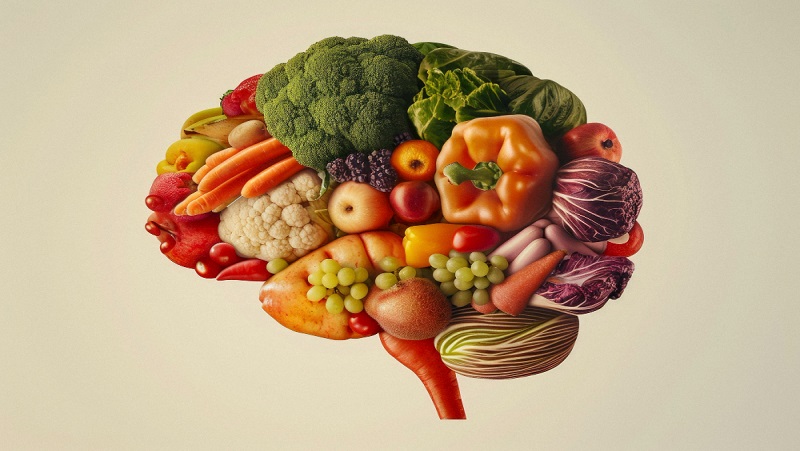An old adage rightly says, “You are what you eat”. The food you eat has a direct impact on not only your weight and physical health, food affects your brain and mental health too! That’s why, it is important to eat a healthy, well-balanced diet that improves your cognitive abilities and mental well-being.
How Does Your Diet Affect Your Mental Health?
Think of your brain as a machinery that works 24X7. It takes care of your thoughts and controls all your voluntary and involuntary actions. But to work round the clock, your brain needs a constant supply of fuel. And this “fuel” comes from the food you eat. That’s why, the food you eat directly impacts your brain and mental health.
Nutrient-Rich Food Enhances Cognitive Function
A healthy, well-balanced diet is rich in vitamins, minerals, omega-3 fatty acids, and antioxidants. It not only helps in effective weight management, the nutrients present in this diet nourish your brain cells and support brain functions. These nutrients also protect your brain cells from oxidative stress (free radicals).
A Balanced Diet Stabilizes Blood Sugar Levels and Promotes Clarity
Maintaining stable blood sugar levels is extremely important for brain health. It keeps your energy levels and mood steady, and a balanced diet goes a long way in helping with that. Unhealthy diets are rich in processed foods, which rapid spikes and crashes in blood sugar levels. This leads to mood swings, irritability, and mental fatigue. Increased consumption of refined sugars impairs your body’s regulation of sugar. They lead to impaired brain functions, severe mood fluctuation, and worsening of mood disorders like depression.
Your Gut Health Influences Mood and Behavior
The gut-brain connection is a critical factor in mental health. A diet high in fiber, fermented foods, and probiotics promotes a healthy gut microbiome. It has been shown that such diets reduce symptoms of depression and anxiety. Foods like yogurt, kimchi, and whole grains can improve gut health and, consequently, mental well-being.
Adequate Hydration is Required for Optimal Brain Function
Drinking enough water is important for healthy brain function. Even a slight dehydration can cause short-term memory loss and affect focus and alertness. Maintaining adequate hydration throughout the day improves mental and cognitive function.
The Impact of Processed Foods on Mental Health
Processed foods have been connected to a number of mental health problems, including:
- Anxiety, Stress, and Sleep Disorders
- Attention Deficit Hyperactivity Disorder (ADHD)
- Depression
- Dementia
- Obsessive-Compulsive Disorder (OCD)
- Bipolar Disorder
- Autism Spectrum Disorder (ASD)
- Schizophrenia
- Cognitive Deficit and Memory Issues
- Syndrome of Chronic Fatigue (CFS)
Foods That You Should Eat to Promote Mental Health
Want to lose weight, boost your mental health, and improve your cognitive abilities? Here’s what you should put in your cart and on your plate:
1. Whole Foods
These foods are packed with nutrients that are essential for brain health. Whole grains, nuts, seeds, and fresh fruits and vegetables can all increase your cognitive function and emotional well-being.
2. Green Leafy Vegetables
Leafy greens are rich in folate, vitamin K, and beta-carotene. They slow cognitive decline and lower the risk of depression. Make sure to include spinach, kale, and Swiss chard in your diet.
3. Fiber-Rich Foods
Fiber-rich foods like beans, lentils, and whole grains help to stabilize blood sugar levels and help in maintaining consistent energy levels and mood. They also promote a healthy gut, which again plays a major role in good mental health.
4. Herbs and Spices
Herbs and spices have anti-inflammatory properties. These herbs aid weight loss and boost brain function. Turmeric, for example, contains curcumin, which has been shown to cross the blood-brain barrier and improve mood and cognitive function.
5. Foods Rich in Antioxidants
Berries, nuts, and dark chocolate are rich in antioxidant-rich. They improve memory, delay brain aging, and protect it from oxidative stress and inflammation.
6. Fermented Foods
Fermented foods like yogurt, kefir, sauerkraut, and kimchi are high in probiotics, which support gut health, which in turn improves mood and cognitive function, and reduces the symptoms of anxiety and depression.
Eat Right with Dr. Mona Lala
Whether you want to lose weight, improve your mental health, or enhance your overall wellbeing, Dr. Mona Lala can help you achieve your health goals. She can assess your current health issues and offer professional advice to develop a customized plan for your overall well-being.
Schedule an appointment with her and start living a healthy life.
With Dr. Lala’s customized approach, you can adopt a better lifestyle and learn about the transformative power of proper nutrition.




